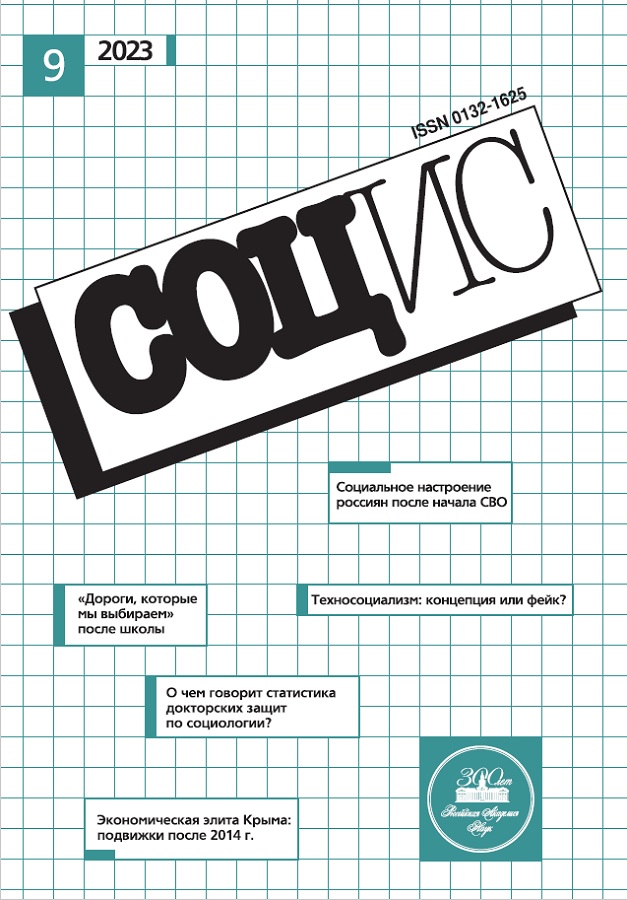Economic Elite of Crimea After 2014
- Autores: Kolesnik N.V.1
-
Afiliações:
- Sociological Institute of FCTAS RAS
- Edição: Nº 9 (2023)
- Páginas: 41-50
- Seção: Articles
- URL: https://cijournal.ru/0132-1625/article/view/661905
- DOI: https://doi.org/10.31857/S013216250027777-7
- ID: 661905
Citar
Texto integral
Resumo
The functioning of the regional elite of new Russian territories is analyzed on the example of Crimea after 2014. The focus of the study is a biographical analysis of the characteristics of 124 leaders of large economic structures of Crimea and 150 deputies of the Crimean parliament of two convocations. The analysis of the data showed that the economic segment of the Crimean elite after integration into the Russian Federation was partially updated. The study revealed that among the owners of economic assets, the management of SUEs, there are more dynamic updates than in other segments of the economic elite. At the same time, if there is recruitment to top positions in Crimean companies, the most often on closed grounds, when there is a transfer from one managerial position to another in the form of maintaining an elite position after 2014. The peak of new appointments/elections to high economic positions in regional companies falls on 2015-2016, when Crimea was integrated into the Russian Federation. An analysis of the forms of interaction between the economic and political elite showed that within the deputies of two convocations (2014 and 2019), representatives of the economic elite occupy more than half of the seats. This only strengthens the elite integration within the region and shows that business is an important part in the political career of deputies.
Palavras-chave
Sobre autores
Natalya Kolesnik
Sociological Institute of FCTAS RASSaint-Petersburg, Russian Federation
Bibliografia
- Быстрова А.С. Тенденции формирования российской элиты Севастополя: пять лет после присоединения к Российской Федерации // Власть и элиты. 2019. Т. 6. № 1. С. 139–168.
- Гаман-Голутвина О.В. Региональные элиты России: персональный состав и тенденции эволюциию // Полис. Политические исследования. 2004. № 2. С. 6–19.
- Дятлов А.В., Ковалев В.В. Трансформация института сити-менеджмента в муниципальном управлении юга России // Социологические исследования. 2021. № 3. С. 66–77.
- Зоткин А.А. Пятилетие «Крымской весны» и проблемы интеграции Крыма в политическую систему России // Власть и элиты. 2019. Т. 6. № 2. С. 5–23.
- Зоткин А.А. Роль региональных элит и столичного истеблишмента в формировании властной элиты Украины // Социология: теория, методы, маркетинг. 2004. № 3. С. 96–108.
- Колесник Н.В. Финансовая элита в российской провинции // Журнал социологии и социальной антропологии. 2000. Т. 3. № 1. С. 102–120.
- Колесник Н.В., Тев Д.Б., Невский А.В. Экономическая элита в российском регионе: методический опыт определения выборочной совокупности // Журнал социологии и социальной антропологии. 2008. № 1. С. 71–91.
- Крыштановская О.В. Бизнес-элита и олигархи: итоги десятилетия // Мир России. 2002. № 4. С. 3–60.
- Матков А.Н. Эволюция партийного государства в ФРГ (1990-1998 гг.) // Преподаватель XXI век. 2011. № 3. С. 267–270.
- Тев Д.Б. Бизнес как источник рекрутирования федеральной административной и политической элиты России // Власть и элиты. 2018. Т. 5. № 1. С. 54–86.
- Туровский Р.Ф. Власть и бизнес в регионах России: современные процессы обновления региональных элит // Региональная элита в современной России / Под ред. Я.Ш. Фрухтманна. М.: Либеральная миссия, 2005.
- Хоффман-Ланге У. Элиты и демократизация: германский опыт // Социологические исследования. 1996. № 4. С. 50–57.
- Цыплакова Е.П. Особенности украинской и российской политической элиты // Известия РГПУ им. А.И. Герцена. 2009. № 97. С. 338–345.
- Чирикова А.Е., Ледяев В.Г. Крупный бизнес и власть в малом российском городе: должник, благодетель, партнер? // Россия реформирующаяся: ежегодник: вып. № 19. М., 2021. С. 302–328.
- Шульга Н. Этапы становления политической элиты в Украине в годы независимости // Социология: теория, методы, маркетинг. 2006. № 4. С. 24–37.
- Barro R., Gordon D. Rules, discretion and reputation in model of monetary policy // Journal of Monetary Economics. 1983. Vol. 12. № 1 (July). P. 101–121.
- Gulbrandsen Т. Ideological Integration and Variation within the Private Business Elite in Norway // European Sociological Review. 2005. № 21(4). P. 329–344.
- Hartmann M. Class-specific habitus and the social reproduction of the business elite in Germany and France // The Sociological Review. 2000. Vol. 48. No. 2: 246–247.
- Hoffmann-Lange U. Methodological Developments in Elite Research // Panel on Changing Modalities of Elite Behaviour and Belief. Fukuoka, 2006.
- Kang D. Crony Capitalism. Corruption and Development in South Korea and Philippines. New York: Cambridge University Press, 2002.
- Kryshtanovskaya O, White S. Putin’s Militocracy // Post-Soviet Affairs. 2003. Vol. 19. No. 4. P. 289–306.
- Larsen A. G. Elites in Denmark. Identifying the elite. University of Copenhagen, 2015.
- Ruostetsaari I. Nordic Elites in Comparative Perspective // Comparative Sociology. 2007. No. 6. P. 158–89.
- Semenova E. Ministerial and Parliamentary Elites in an Executive-Dominated System: Post-Soviet Russia 1991-2009 // Comparative Sociology. 2011. No. 10 (6). P. 908–927.
- Tornell A. Economic Crisis and Reform in Mexico // Haber S. (ed.). Crony Capitalism and Economic Growth in Latin America: Theory and Evidence. Stanford, California: Hoover Institution Press, 2002. P. 127–150.
- Useem M. Corporations and the Corporate Elite // Annual Review of Sociology. 1980. Vol. 6. P. 41–77.
- Useem M. The Social Organisation of the American Business Elite and Participation of Corporation Directors in the Governance of American Institutions// American Sociological Review. 1979. No. 4. P. 553–572.
Arquivos suplementares










